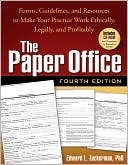List Books » The Paper Office, Fourth Edition: Forms, Guidelines, and Resources to Make Your Practice Work Ethically, Legally, and Profitably
Category Books
- Fiction Books & Literature
- Graphic Novels
- Horror
- Mystery & Crime
- Poetry
- Romance Books
- Science Fiction & Fantasy
- Thrillers
- Westerns
- Ages 0-2
- Ages 3-5
- Ages 6-8
- Ages 9-12
- Teens
- Children's Books
- African Americans
- Antiques & Collectibles
- Art, Architecture & Photography
- Bibles & Bible Studies
- Biography
- Business Books
- Christianity
- Computer Books & Technology Books
- Cookbooks, Food & Wine
- Crafts & Hobbies Books
- Education & Teaching
- Engineering
- Entertainment
- Foreign Languages
- Game Books
- Gay & Lesbian
- Health Books, Diet & Fitness Books
- History
- Home & Garden
- Humor Books
- Judaism & Judaica
- Law
- Medical Books
- New Age & Spirituality
- Nonfiction
- Parenting & Family
- Pets
- Philosophy
- Political Books & Current Events Books
- Psychology & Psychotherapy
- Reference
- Religion Books
- Science & Nature
- Self Improvement
- Sex & Relationships
- Social Sciences
- Sports & Adventure
- Study Guides & Test Prep
- Travel
- True Crime
- Weddings
- Women's Studies
The Paper Office, Fourth Edition: Forms, Guidelines, and Resources to Make Your Practice Work Ethically, Legally, and Profitably » (4th Edition)

Authors: Edward L. Zuckerman
ISBN-13: 9781593858353, ISBN-10: 1593858353
Format: Paperback
Publisher: Guilford Publications, Inc.
Date Published: September 2008
Edition: 4th Edition
Author Biography: Edward L. Zuckerman
Edward L. Zuckerman, PhD, has worked with adults with developmental disabilities as well as those with severe alcohol addiction, acted as liaison with state hospitals, taught undergraduates, and been in the independent practice of general clinical psychology for many years. He now lives with his family in rural western Pennsylvania with horses, ducks, geese, chickens, and lots of mud and trees. There he consults and creates worthwhile practice tools for clinicians.
Book Synopsis
Providing essential recordkeeping and risk-reduction tools that every psychotherapy practice needs, this highly practical resource is now in a fully updated fourth edition. It is ideal for new practitioners who want to hit the ground running and for seasoned pros who want to streamline their paperwork and clinical efficiency. Presented are methods for assuring informed consent and documenting treatment planning and progress; advice on structuring fees, billing, coping with managed care, and marketing; forms and guidelines to facilitate HIPAA compliance; links to useful websites; and much more. More than 60 reproducible forms and handouts--in a ready-to-use, large-size format--can be copied from the book or customized and printed from the accompanying CD-ROM.
Doody Review Services
Reviewer:Nicholas Greco IV, MS, BCETS, CATSM(Abbott Laboratories)
Description:This is a welcome addition to an ever-changing and complex field of practice in which clinicians are constantly in need of reliable documentation templates. This latest edition is fully updated for current practice, with increased coverage of HIPAA rules and implementation, office safety guidelines, and how to set up a website for a therapy practice.
Purpose:As in all of this author's books, The Paper Office is designed to help practicing clinicians do what they do best -- practice. The book is designed to help them and their practices become less vulnerable, more efficient, and more profitable and stable as a business. Clinicians receive the needed guidance on proper documentation using the provided forms, guidelines, and resources, all of which help to ensure an ethical and legal practice.
Audience:Both newly minted and currently practicing clinicians will benefit immensely from this latest edition. Not only will clinicians be able to reduce the legal risks of practicing, they will also be able to promote profitability by streamlining documentation. The author is an expert on documentation in clinical practice.
Features:What doesn't this book cover? This is one of the most thorough resources on ethical and legal documentation available. The author not only discusses what clinicians need to document, he also demonstrates how with reproducible forms and templates in the book and on the enclosed CD. Having all of the forms on CD alone is worth the price of this book. It covers the most basic documentation needs such as stationery and cards as well as ethical aspects of self-presentation, confidentiality, and release of records. The discussion of working and dealing with managed care organizations is a highlight of this book.
Assessment:The author does it again with this fourth edition. All mental health practitioners need to have a copy of this book, not just for themselves, but also for the livelihood of their practice.
Table of Contents
List of Figures, Forms, and Handouts
Introduction 1
1 Basic Paperwork and Communication Tools 9
2 Financial Tools and Procedures 41
3 Reducing Malpractice Risk by Operating Ethically 77
4 Getting Informed Consent 176
5 Intake and Assessment Forms and Procedures 253
6 Planning and Then Documenting Treatment 330
7 Confidentiality and Releasing Records 385
Appendices Resources 439
References 447
Index 463
Subjects
 Medicine
Medicine  Administration & Management
Administration & ManagementNonfiction
 Psychology
Psychology  Clinical Psychology
Clinical PsychologyPsychology & Psychotherapy
 Clinical Psychology
Clinical Psychology  Psychiatry - General & Miscellaneous
Psychiatry - General & MiscellaneousPsychology & Psychotherapy
 Clinical Psychology
Clinical Psychology  Psychotherapy
PsychotherapyPsychology & Psychotherapy
 Psychological Disorders
Psychological Disorders  Psychiatry - General & Miscellaneous
Psychiatry - General & MiscellaneousPsychology & Psychotherapy
 Psychological Disorders
Psychological Disorders  Psychotherapy
PsychotherapyMedical Books
 Psychology & Psychotherapy
Psychology & Psychotherapy  Clinical Psychology
Clinical PsychologyMedical Books
 Psychology & Psychotherapy
Psychology & Psychotherapy  Psychological Disorders
Psychological DisordersNonfiction
 Medicine
Medicine  Medicine
Medicine
